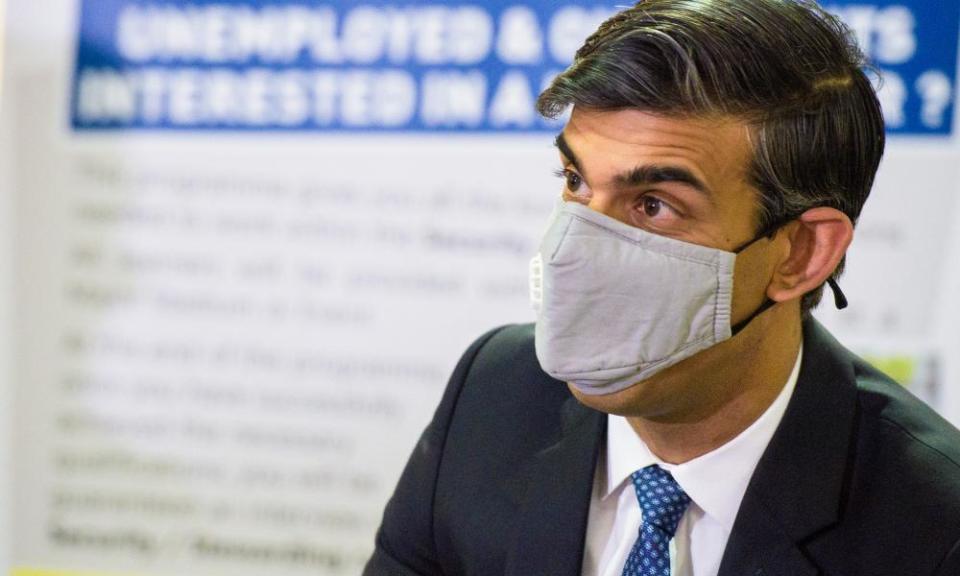Will Covid's mass unemployment force a change of attitude to our welfare system?

As the Conservatives launched their 3D virtual conference only to suffer a technical glitch that meant the audience couldn’t hear what ministers were saying, it was hard not to be aware of the symbolism: half a year into the government’s inept handling of the coronavirus crisis, for all the bluster, they may as well be talking to themselves.
Few things demonstrate this more than the strategy – or lack thereof – for addressing the economic fallout of the pandemic. As furlough comes to an end this month and the spectre of mass unemployment in Britain looms, there is barely even a pretence by the government that it has a plan to help families pay their bills. Chancellor Rishi Sunak’s pledge to provide new “job coaches” is little help when there are no jobs.
The government is responding to forthcoming mass unemployment by weakening the safety net that will be needed to catch people. Ministers are pushing ahead with cutting the £20 a week Covid boost to the basic allowances for universal credit and tax credits – a move that is predicted to push an estimated 700,000 households into poverty. It is worth noting that even during the height of lockdown, this increase was never given to people on older, legacy benefits – many of whom are severely ill or disabled. Like most cuts, this is not one that will fall evenly: research by the Resolution Foundation says one in three working age families in “red wall” constituencies will be £1,000 a year worse off if the £20 cut goes ahead.
Meanwhile, hundreds of thousands of people who have lost their job in the pandemic have been denied universal credit altogether. Strict means-testing – including having savings or their partner being paid“too much” – is seeing many people who are struggling with redundancy or the collapse of their business given next to no help to pay their rent or mortgage.
It is a stark lesson not only in the state of Britain’s broken benefit system but how public indifference in recent years has enabled it. A decade of austerity openly and brazenly cut state support for people experiencing periods of unemployment, illness and low pay, with devastating fallout. Food bank queues spread. Disabled people spoke of humiliating assessments. Child poverty rocketed. And yet ask the average voter, and all this barely broke through. As one new claimant, a former airline pilot who was made redundant before lockdown, told the Guardian, “I did not realise that the social security system in this country was in such bad shape.”
Related: Cut to £20-a-week Covid boost will lead to big rise in poverty, UK charities warn
Coronavirus did not create the failings in our social security system, but it has made them altogether harder to ignore. The government’s refusal to take this seriously is a natural consequence not only of Tory small-state ideology but the tension over how to balance saving lives and jobs: the Department of Health and Social Care wants to suppress the virus, which inevitably hits local economies and jobs, while the Treasury is desperate to open the economy back up. The result is a situation where millions of people are losing their jobs but the state isn’t providing enough support to help them survive it. Just look at the removal of the £20-a-week increase: it would result in the level of unemployment support in the UK falling to its lowest real-terms level since 1991, and its lowest ever level relative to average weekly earnings – just at the very time more people are going to need it.
Minsters managed to dismantle social security over the past decade with little mainstream backlash, but the next round of cuts may be harder to get away with. The Tory binary of “scroungers versus strivers” was always a toxic lie, but the pandemic has further exposed it. There are currently about six million households on universal credit or tax credits, twice as many as before the pandemic. Many of these claimants are middle-income families who are having to turn to the benefit system for the first time in their lives: over a quarter of new universal credit claimants are from managerial, administrative and professional backgrounds.
It would be naive to think this novel middle-class experience alone would be enough to force change, but it may prove plenty when combined with the ire of red wall voters who have all too much experience of being forgotten by politicians. The Conservatives proudly announced the opening of a new party headquarters in Leeds this week, as a nod to their new northern constituents – but it is not empty gestures that will feed their kids. As winter and its mass job losses approaches, the Tories may find themselves having to admit a truth they’ve long been denying: Britain needs a well-funded social safety net, and it always has.
• Frances Ryan is a Guardian columnist

 Yahoo News
Yahoo News 